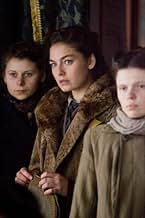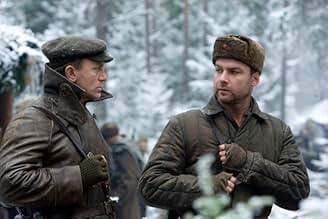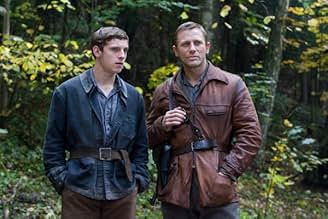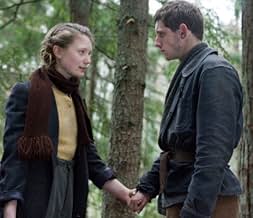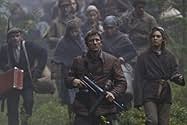Jüdische Brüder im von den Nazis besetzten Osteuropa fliehen in die weißrussischen Wälder, wo sie sich den russischen Widerstandskämpfern anschließen und versuchen, ein Dorf zu bauen, um sic... Alles lesenJüdische Brüder im von den Nazis besetzten Osteuropa fliehen in die weißrussischen Wälder, wo sie sich den russischen Widerstandskämpfern anschließen und versuchen, ein Dorf zu bauen, um sich und etwa tausend jüdische Nichtkämpfer zu schützen.Jüdische Brüder im von den Nazis besetzten Osteuropa fliehen in die weißrussischen Wälder, wo sie sich den russischen Widerstandskämpfern anschließen und versuchen, ein Dorf zu bauen, um sich und etwa tausend jüdische Nichtkämpfer zu schützen.
- Regie
- Drehbuch
- Hauptbesetzung
- Für 1 Oscar nominiert
- 2 Gewinne & 5 Nominierungen insgesamt
Empfohlene Bewertungen
"Defiance" is a very entertaining, exciting, suspenseful, and inspirational film about a tough topic: the Holocaust. Its many action sequences are well-paced and well-motivated. You know exactly why Tuvia Bielski (Daniel Craig) breaks into a home and points a gun at a man in front of his family. Daniel Craig and Live Schreiber are terrific as Tuvia and Zus Bielski, who lead a band of Jewish forest partisans during World War Two, thus saying over a thousand lives.
The movie is not perfect. Characters speak English with Slavic accents. In other scenes, they speak Russian or Belarusian. Craig and Schreiber manage very good Slavic accents, both when speaking English and when speaking the Slavic languages, but Craig occasionally lapses into his English accent when speaking English. Female characters are not particularly well drawn, or given much to do. While this film is very good, it doesn't have the production values to be a timeless classic like "Schindler's List." The movie is controversial. Most of the controversies are shallow relative to the most important facts at hand. Many of those attacking this movie have axes to grind, including current events in the Middle East or feuds between Poles and Jews. The most important fact is this: the Nazis committed a genocide of six million Jews. In the midst of this Satanic nightmare, the Bielskis managed to save over a thousand Jews. That's the main, and absolutely true, point here, and it should not be lost in bickering over details.
Compared to other treatments of the Holocaust, this film is fair. It doesn't show Slavic peasants as uniformly Jew-hating collaborators. Nazis, not Slavic peasants, were the authors and perpetrators of the Holocaust. Some occupied peoples collaborated, often out of fear and for financial gain or as payback for old grudges. Some occupied peoples did everything they could to help Jews, as does a Belarusian peasant in this film.
The Bielskis were not immaculate. They did summarily execute captured Germans, as shown here. They did raid peasants for provisions, as shown here. They did work with the Soviets, but so did Uncle Sam. Remember that photo of FDR and Churchill smiling with Stalin at Yalta. The Polish IPN institute is investigating charges that members of the Bielski partisans, but not the Bielskis themselves, participated in the 1943 Soviet massacre of 128 people in Naliboki. Aron, the youngest Bielski brother, was, in 2007, accused of defrauding an elderly Polish woman. These failures of the Bielski brothers to be perfect in no way lessen their achievement, any more than any failure to be perfect lessen any hero's achievement. Again, in the face of genocide, the Bielski brothers managed to save over a thousand people. Were they perfect? No. Were they admirable, heroic, and worth learning about? Absolutely yes.
The movie is not perfect. Characters speak English with Slavic accents. In other scenes, they speak Russian or Belarusian. Craig and Schreiber manage very good Slavic accents, both when speaking English and when speaking the Slavic languages, but Craig occasionally lapses into his English accent when speaking English. Female characters are not particularly well drawn, or given much to do. While this film is very good, it doesn't have the production values to be a timeless classic like "Schindler's List." The movie is controversial. Most of the controversies are shallow relative to the most important facts at hand. Many of those attacking this movie have axes to grind, including current events in the Middle East or feuds between Poles and Jews. The most important fact is this: the Nazis committed a genocide of six million Jews. In the midst of this Satanic nightmare, the Bielskis managed to save over a thousand Jews. That's the main, and absolutely true, point here, and it should not be lost in bickering over details.
Compared to other treatments of the Holocaust, this film is fair. It doesn't show Slavic peasants as uniformly Jew-hating collaborators. Nazis, not Slavic peasants, were the authors and perpetrators of the Holocaust. Some occupied peoples collaborated, often out of fear and for financial gain or as payback for old grudges. Some occupied peoples did everything they could to help Jews, as does a Belarusian peasant in this film.
The Bielskis were not immaculate. They did summarily execute captured Germans, as shown here. They did raid peasants for provisions, as shown here. They did work with the Soviets, but so did Uncle Sam. Remember that photo of FDR and Churchill smiling with Stalin at Yalta. The Polish IPN institute is investigating charges that members of the Bielski partisans, but not the Bielskis themselves, participated in the 1943 Soviet massacre of 128 people in Naliboki. Aron, the youngest Bielski brother, was, in 2007, accused of defrauding an elderly Polish woman. These failures of the Bielski brothers to be perfect in no way lessen their achievement, any more than any failure to be perfect lessen any hero's achievement. Again, in the face of genocide, the Bielski brothers managed to save over a thousand people. Were they perfect? No. Were they admirable, heroic, and worth learning about? Absolutely yes.
This is an interesting film about a bunch of Jews commanded by the Bielski brothers taking the Belorussia forests to shelter themselves from Nazi criminals . It is completely set in the woods which it does some claustrophobic . Splendid acting by all-star-cast . Nicely photographed by Eduardo Serra in colorful palette . Emotive and sensitive musical score by the great composer James Newton Howard. This is a true story , worth telling and stunningly directed in old-style by Edward Zwick .
The picture is inspired on real events based on the novel titled ¨Defiance : The Balski partisans¨ , being well adapted by Clayton Frohman and Edward Zwick . The actual events are the followings : The Bielski group's partisan (three brothers finely performed by Daniel Craig , Liev Schriever , Jamie Bell) activities were aimed to hold the Jewish community together and fight against the Nazis and their collaborators, such as Belarusian volunteer policemen or local inhabitants who had betrayed or killed Jews. They also conducted sabotage missions . The Nazi regime offered a reward for assistance in the capture of Tuvia (Daniel Craig) Bielski, and in 1943, led major clearing operations against all partisan groups in the area. Some of these groups suffered major casualties, but the Bielski partisans fled safely to a more remote part of the forest , and continued to offer protection to the noncombatants among their band . The Bielski group would raid nearby villages and forcibly seize food ; on occasion peasants who refused to share their food with the partisans were the subject of violence and even murder. This caused hostility towards the partisans from peasants in the villages, though some would help the Jewish partisans.The Bielski partisans eventually became affiliated with Soviet organisations in the vicinity of the Naliboki Forest under Russian General (in the movie Panchenko is played by Ravil Isyanov). Several attempts by Soviet partisan commanders to absorb Bielski fighters into their units were resisted, such that the Jewish partisan group retained its integrity and remained under Tuvia Bielski's command. This allowed him to continue in his dedication to protect Jewish lives along with engaging in combat activity, but would also prove a problem later on . The Bielski partisan leaders split the group into two units, one named Ordzhonikidze, led by Zus (Liev Schreiber), and the other Kalinin, commanded by Tuvia (Daniel Craig). According to partisan documentation , Bielski fighters from both units killed a total of 381 enemy fighters , sometimes during joint actions with Soviet groups. 50 members of the group were killed. In the summer of 1944, when the Soviet counteroffensive began in Belarus and the area was taken over by the Soviets, the Kalinin unit , numbering 1,230 men, women and children, emerged from the forest and marched into Nowogrodek.Despite their previous collaboration with the Soviets, relations quickly worsened. The NKVD started interrogating the Bielski brothers about the rumours of loot they had reportedly collected during the war, and about their failure to "implement socialist ideals in the camp". Asael Bielski (Jamie Bell) was conscripted into the Soviet Red Army and fell in the Battle of Königsberg in 1945. The remaining brothers escaped Soviet-controlled lands, emigrating West. After the war, Tuvia Bielski returned to Poland, then emigrated to present-day Israel in 1945. Tuvia and Zus eventually settled in the United States. They operated a successful trucking business. When Tuvia died in 1987, he was buried in Long Island, NY, but a year later, at the urging of surviving partisans in Israel, he was exhumed and given a hero's funeral at the hillside graveyard in Jerusalem. His wife, Lilka (Alexa Davalos), was buried beside him in 2001 . None of the Bielskis ever sought any recognition or reward for their actions.
The picture is inspired on real events based on the novel titled ¨Defiance : The Balski partisans¨ , being well adapted by Clayton Frohman and Edward Zwick . The actual events are the followings : The Bielski group's partisan (three brothers finely performed by Daniel Craig , Liev Schriever , Jamie Bell) activities were aimed to hold the Jewish community together and fight against the Nazis and their collaborators, such as Belarusian volunteer policemen or local inhabitants who had betrayed or killed Jews. They also conducted sabotage missions . The Nazi regime offered a reward for assistance in the capture of Tuvia (Daniel Craig) Bielski, and in 1943, led major clearing operations against all partisan groups in the area. Some of these groups suffered major casualties, but the Bielski partisans fled safely to a more remote part of the forest , and continued to offer protection to the noncombatants among their band . The Bielski group would raid nearby villages and forcibly seize food ; on occasion peasants who refused to share their food with the partisans were the subject of violence and even murder. This caused hostility towards the partisans from peasants in the villages, though some would help the Jewish partisans.The Bielski partisans eventually became affiliated with Soviet organisations in the vicinity of the Naliboki Forest under Russian General (in the movie Panchenko is played by Ravil Isyanov). Several attempts by Soviet partisan commanders to absorb Bielski fighters into their units were resisted, such that the Jewish partisan group retained its integrity and remained under Tuvia Bielski's command. This allowed him to continue in his dedication to protect Jewish lives along with engaging in combat activity, but would also prove a problem later on . The Bielski partisan leaders split the group into two units, one named Ordzhonikidze, led by Zus (Liev Schreiber), and the other Kalinin, commanded by Tuvia (Daniel Craig). According to partisan documentation , Bielski fighters from both units killed a total of 381 enemy fighters , sometimes during joint actions with Soviet groups. 50 members of the group were killed. In the summer of 1944, when the Soviet counteroffensive began in Belarus and the area was taken over by the Soviets, the Kalinin unit , numbering 1,230 men, women and children, emerged from the forest and marched into Nowogrodek.Despite their previous collaboration with the Soviets, relations quickly worsened. The NKVD started interrogating the Bielski brothers about the rumours of loot they had reportedly collected during the war, and about their failure to "implement socialist ideals in the camp". Asael Bielski (Jamie Bell) was conscripted into the Soviet Red Army and fell in the Battle of Königsberg in 1945. The remaining brothers escaped Soviet-controlled lands, emigrating West. After the war, Tuvia Bielski returned to Poland, then emigrated to present-day Israel in 1945. Tuvia and Zus eventually settled in the United States. They operated a successful trucking business. When Tuvia died in 1987, he was buried in Long Island, NY, but a year later, at the urging of surviving partisans in Israel, he was exhumed and given a hero's funeral at the hillside graveyard in Jerusalem. His wife, Lilka (Alexa Davalos), was buried beside him in 2001 . None of the Bielskis ever sought any recognition or reward for their actions.
I enjoyed "Defiance" immensely -- there was humor and heartache, with a liberal dose of action. Not a brainless action movie, enough of a story to make it memorable, and fast-paced enough to keep me from becoming bored.
On the other hand, although the movie captures the spirit of the story, it is far from a documentary, and I'd have preferred a more historically accurate film. I'm biased, though -- I read the Peter Duffy book "Bielski Brothers" soon after it was released ("Defiance" is based on a different book), and I found the real story even more compelling than the Hollywood version.
Nonetheless, I live in the real world where directors have to shoot on a budget, and this was a good, diverting peek into a story that was long overdue to be told.
On the other hand, although the movie captures the spirit of the story, it is far from a documentary, and I'd have preferred a more historically accurate film. I'm biased, though -- I read the Peter Duffy book "Bielski Brothers" soon after it was released ("Defiance" is based on a different book), and I found the real story even more compelling than the Hollywood version.
Nonetheless, I live in the real world where directors have to shoot on a budget, and this was a good, diverting peek into a story that was long overdue to be told.
I've registered here just to write that I'm amazed by some reviews pointing that Zwick was inaccurate or illiterate when making his film. And it's really amusing to read that 'partisans couldn't speak Russian because Naliboki was a Polish town'.
Naliboki is a town in the very center of present Belarus. It's a point were cultures mixed. For many centuries everybody here mastered at least 3 languages, and elder Belski spoke 6 of them: Yiddish, Hebrew, Polish, Belarusian, Russian, German. It's not so impossible, I may assure you:)
Actually, Russian is appropriate only in episodes when Zus Belski talks to a Soviet partisans' commander - that guy was from Moscow. I'm pretty sure, that in reality Jews talked to their neighbors in Yiddish and got answers in Polish or Belarusian. As for Belskies, they where the only Jewish family in their village, so they should master Slavic languages perfectly.
Naliboki is a town in the very center of present Belarus. It's a point were cultures mixed. For many centuries everybody here mastered at least 3 languages, and elder Belski spoke 6 of them: Yiddish, Hebrew, Polish, Belarusian, Russian, German. It's not so impossible, I may assure you:)
Actually, Russian is appropriate only in episodes when Zus Belski talks to a Soviet partisans' commander - that guy was from Moscow. I'm pretty sure, that in reality Jews talked to their neighbors in Yiddish and got answers in Polish or Belarusian. As for Belskies, they where the only Jewish family in their village, so they should master Slavic languages perfectly.
The movie was good. Not Zwick's best effort though and as for the acting it was Liev Schreiber that delivered the most. Every time I see Craig I see James Bond and that other guy, Jamie Bell, was barely even on screen. I'm guessing most of his scenes were cut out of the film to pave the way for more Craig screen time. The action set pieces were mostly impressive but the problem is, its over before you know it. But I can honestly say, it was impressive nonetheless. Its not brainless by any means, the movie has a profound and compelling story. One can only wonder how these filmmakers come up with more WWII movie ideas every year.
From a visual point of view, the movie looks absolutely beautiful. From the authentic weaponry and uniforms to the rich and colorful Lithuanian locations, Defiance may fall flat during some points throughout the film; as with every other black and white war movies that's been released, the Germans are depicted as war machines of death without remorse, if you can overlook these flaws I think it is an enjoyable film and in its entirety, Defiance is an overwhelming movie that doesn't glamorize the war but shows the intense reality behind it all. A must see for all war movie fans out there.
From a visual point of view, the movie looks absolutely beautiful. From the authentic weaponry and uniforms to the rich and colorful Lithuanian locations, Defiance may fall flat during some points throughout the film; as with every other black and white war movies that's been released, the Germans are depicted as war machines of death without remorse, if you can overlook these flaws I think it is an enjoyable film and in its entirety, Defiance is an overwhelming movie that doesn't glamorize the war but shows the intense reality behind it all. A must see for all war movie fans out there.
Wusstest du schon
- WissenswertesThe film was shot in a remote, wooded area in Lithuania, about a hundred miles away from the real location of the Bielski brothers camp.
- PatzerZus and some others go to the police station to get Ampicillin to treat the pneumonia that is common in the camp. Ampicillin did not come into clinical use until 1961. Even "simple" penicillin would not have been available in Belorussia in the early 1940s.
- Zitate
Tuvia Bielski: Our revenge is to live.
- VerbindungenFeatured in 2009 Golden Globe Awards (2009)
Top-Auswahl
Melde dich zum Bewerten an und greife auf die Watchlist für personalisierte Empfehlungen zu.
Details
Box Office
- Budget
- 32.000.000 $ (geschätzt)
- Bruttoertrag in den USA und Kanada
- 28.644.813 $
- Eröffnungswochenende in den USA und in Kanada
- 123.513 $
- 4. Jan. 2009
- Weltweiter Bruttoertrag
- 51.262.751 $
- Laufzeit
- 2 Std. 17 Min.(137 min)
- Farbe
- Sound-Mix
- Seitenverhältnis
- 1.85 : 1
Zu dieser Seite beitragen
Bearbeitung vorschlagen oder fehlenden Inhalt hinzufügen









